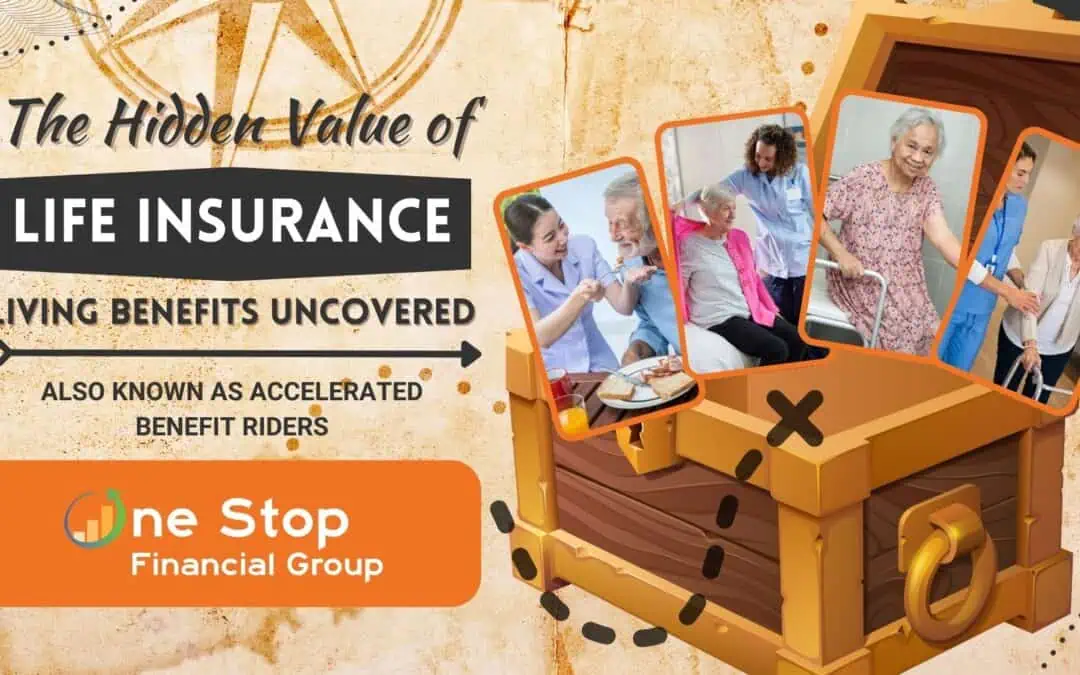Life insurance is often associated with benefits to support to loved ones after a policyholder’s passing. However, many life insurance policies offer “living benefits,” allowing policyholders to access a portion of their death benefit while still alive under certain circumstances. These benefits can be a crucial financial safety net in times of medical emergencies, chronic illnesses, or other qualifying conditions. At One Stop Financial Group, we specialize in helping individuals and families maximize their life insurance policies, ensuring they receive the best coverage tailored to their needs.

What Are Living Benefits?
Living benefits, also known as Accelerated Benefit Riders in some policies, are features within certain life insurance policies that allow policyholders to tap into their death benefit while still alive. These benefits are typically triggered by qualifying events such as critical illness, chronic illness, terminal illness, or long-term care needs. Having access to these funds can provide financial relief for medical expenses, household bills, and lost income.
Life Insurance Policies That Offer Living Benefits
Several types of life insurance policies include living benefits. Below, we outline these policies and the advantages they offer.
1. Term Life Insurance with Living Benefits
While traditional term life insurance is designed primarily for death benefit protection, some policies include riders that offer living benefits.
- Critical Illness Rider – Provides access to funds if diagnosed with serious conditions such as heart attack, cancer, or stroke.
- Chronic Illness Rider – Pays out if the insured cannot perform at least two activities of daily living (ADLs), such as bathing or dressing.
- Terminal Illness Rider – Allows policyholders to access a portion of their death benefit if diagnosed with a terminal illness and given a life expectancy of 12 to 24 months.
2. Whole Life Insurance with Living Benefits
Whole life insurance not only provides lifetime coverage but also builds cash value over time that can be utilized while the policyholder is alive.
- Cash Value Loans – Policyholders can borrow against their policy’s accumulated cash value to cover unexpected expenses.
- Accelerated Death Benefit (ADB) Rider – Offers financial assistance in cases of terminal, chronic, or critical illness.
- Dividends (for Participating Policies) – Some whole life policies pay dividends that can be used as income or reinvested to grow the policy’s value.

3. Quality of Life Insurance
Quality of Life insurance is a specialized form of life insurance designed specifically to offer living benefits that provide financial support during life-altering events.
- Accelerated Benefit Riders – Allows policyholders to access funds in the event of a qualifying chronic, critical, or terminal illness.
- Flexible Use of Funds – Policyholders can use benefits for medical treatments, home modifications, or everyday expenses.
- Customizable Coverage – Offers policyholders the ability to tailor coverage to their specific needs, providing peace of mind beyond traditional death benefits.
4. Universal Life Insurance with Living Benefits
Universal life insurance provides flexible premium payments and a cash value component, making it a great option for those seeking living benefits.
- Flexible Cash Withdrawals – Policyholders can access their cash value to supplement income or cover emergency expenses.
- Long-Term Care Rider – Pays benefits if the insured requires extended care services, such as assisted living or home health care.
- Chronic Illness and Critical Illness Riders – Similar to term life policies, these riders provide payouts for serious medical conditions.

5. Indexed Universal Life (IUL) Insurance with Living Benefits
Indexed Universal Life insurance (IUL) offers the potential for cash value growth based on stock market index performance, along with living benefits.
- Tax-Favored Loans – Policyholders can take out loans from the policy’s cash value without tax penalties.
- Chronic & Critical Illness Benefits – Provides financial relief if diagnosed with severe medical conditions.
- Income Supplement in Retirement – The cash value can serve as an additional income stream during retirement.
Why Living Benefits Matter
Having a life insurance policy with living benefits can make a substantial difference in a family’s financial stability. These benefits help cover:
- Medical Bills & Treatment Costs – Covering expensive healthcare needs without depleting savings.
- Daily Living Expenses – Supporting the family during loss of income due to illness.
- Long-Term Care Needs – Paying for nursing home care, home health aides, or assisted living.
- Debt Relief – Preventing financial burden from outstanding loans or mortgages.
What Happens to Your Policy After You Pass Away?
While living benefits allow policyholders to access a portion of their death benefit while alive, it’s important to understand what remains after their passing. Any amount withdrawn from the policy through living benefits is deducted from the total death benefit, reducing the amount paid to beneficiaries. However, the remaining death benefit is still paid out to designated beneficiaries, ensuring financial security for loved ones. Additionally, policies with cash value components, such as whole life or universal life insurance, may continue to accumulate value, providing further support for heirs. Your agent can structure your policy to suit your particular needs.
Secure Your Future with One Stop Financial Group
Living benefits are a crucial feature of modern life insurance policies, providing financial security during unexpected hardships. At One Stop Financial Group, we understand that life insurance should serve as more than just a safety net for loved ones—it should also offer financial support when you need it most. Our team of experienced professionals is dedicated to helping you find the best policy that aligns with your personal and financial goals.
Contact One Stop Financial Group today to learn how living benefits can provide financial peace of mind for you and your family.



